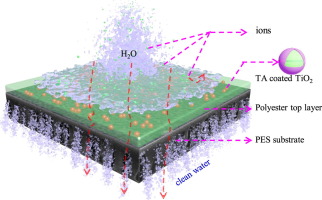当前位置:
X-MOL 学术
›
J. Colloid Interface Sci.
›
论文详情
Our official English website, www.x-mol.net, welcomes your
feedback! (Note: you will need to create a separate account there.)
In-situ coating TiO2 surface by plant-inspired tannic acid for fabrication of thin film nanocomposite nanofiltration membranes toward enhanced separation and antibacterial performance.
Journal of Colloid and Interface Science ( IF 9.4 ) Pub Date : 2020-03-24 , DOI: 10.1016/j.jcis.2020.03.087 Tong Li 1 , Yirong Xiao 1 , Dongxue Guo 1 , Liguo Shen 1 , Renjie Li 1 , Yang Jiao 1 , Yanchao Xu 1 , Hongjun Lin 1
Journal of Colloid and Interface Science ( IF 9.4 ) Pub Date : 2020-03-24 , DOI: 10.1016/j.jcis.2020.03.087 Tong Li 1 , Yirong Xiao 1 , Dongxue Guo 1 , Liguo Shen 1 , Renjie Li 1 , Yang Jiao 1 , Yanchao Xu 1 , Hongjun Lin 1
Affiliation

|
A major issue hindering development of thin film nanocomposite (TFN) nanofiltration (NF) membrane is the interfacial defects induced by nanomaterial aggregation in top layer. Although various nanomaterials surface modification strategies have been developed to eliminate the interfacial defects, they usually involve extra modification steps and complex post-treatments. Inspired by the substrate-independent coating ability of tannic acid (TA) and the fact that the phenolic hydroxyl groups in TA can react with acyl chloride group in trimesoyl chloride, a TA coating solution containing TiO2 nanoparticles was used as an aqueous phase of interfacial polymerization to prepare interfacial modified TFN NF membranes in this study. Surface modification of TiO2 nanoparticles and interfacial polymerization can be carried out in a single step without any extra pre-modification step. It was found that the TA coating on TiO2 nanoparticles surface could decrease TiO2 aggregations and enhance interfacial compatibility between TiO2 and polyester matrix. The TFN NF membrane prepared at a TiO2 loading of 0.020 wt% exhibited a pure water flux of 28.8 L m-2 h-1 (284% higher than that of the controlled TFC membrane), and possessed enhanced NaCl and Na2SO4 rejections of 57.9% and 94.6%, respectively, breaking through the trade-off between permeability and selectivity.
中文翻译:

用植物启发性的单宁酸原位涂覆TiO2表面,以制造薄膜纳米复合纳米过滤膜,以增强分离和抗菌性能。
阻碍薄膜纳米复合材料(TFN)纳滤(NF)膜发展的一个主要问题是纳米材料在顶层的聚集引起的界面缺陷。尽管已开发出各种纳米材料表面改性策略来消除界面缺陷,但它们通常涉及额外的改性步骤和复杂的后处理。受单宁酸(TA)的不依赖底物的涂层能力以及TA中的酚羟基可以与均苯三甲酰氯中的酰氯基团反应的事实启发,将包含TiO2纳米颗粒的TA涂层溶液用作界面聚合的水相在本研究中制备界面改性的TFN NF膜。TiO2纳米颗粒的表面改性和界面聚合可以在一个步骤中进行,而无需任何额外的预改性步骤。研究发现,TiO2纳米颗粒表面的TA涂层可以减少TiO2的聚集并增强TiO2与聚酯基体之间的界面相容性。TiO2负载量为0.020 wt%时制备的TFN NF膜的纯水通量为28.8 L m-2 h-1(比受控TFC膜高284%),NaCl和Na2SO4截留率提高了57.9%和94.6%,分别突破了渗透率和选择性之间的权衡。
更新日期:2020-03-26
中文翻译:

用植物启发性的单宁酸原位涂覆TiO2表面,以制造薄膜纳米复合纳米过滤膜,以增强分离和抗菌性能。
阻碍薄膜纳米复合材料(TFN)纳滤(NF)膜发展的一个主要问题是纳米材料在顶层的聚集引起的界面缺陷。尽管已开发出各种纳米材料表面改性策略来消除界面缺陷,但它们通常涉及额外的改性步骤和复杂的后处理。受单宁酸(TA)的不依赖底物的涂层能力以及TA中的酚羟基可以与均苯三甲酰氯中的酰氯基团反应的事实启发,将包含TiO2纳米颗粒的TA涂层溶液用作界面聚合的水相在本研究中制备界面改性的TFN NF膜。TiO2纳米颗粒的表面改性和界面聚合可以在一个步骤中进行,而无需任何额外的预改性步骤。研究发现,TiO2纳米颗粒表面的TA涂层可以减少TiO2的聚集并增强TiO2与聚酯基体之间的界面相容性。TiO2负载量为0.020 wt%时制备的TFN NF膜的纯水通量为28.8 L m-2 h-1(比受控TFC膜高284%),NaCl和Na2SO4截留率提高了57.9%和94.6%,分别突破了渗透率和选择性之间的权衡。










































 京公网安备 11010802027423号
京公网安备 11010802027423号